Impacts and Outreach
CIVS’s multidisciplinary research projects have substantial economic and intellectual impacts on local and global communities and industries and provide great research opportunities for Purdue Northwest faculty and students.
Highlights Since 2009
- $40+ million in savings for companies facilitated by several grant-funded projects
- $40+ in external grants and contracts
- 180+ external organizations collaborated with CIVS
- 450+ research projects
- 700+ national and local news mentions
- 2,200+ students employed and mentored
- 11,600+ students used CIVS for virtual labs
- 200+ Purdue Northwest faculty and staff collaborators
- 320+ student awards and grants (globally since 2011)
- 43,000+ local, national, and international visitors
Community Engagement
CIVS projects—more than 450 to date—have involved working closely with industry, K-12 schools, colleges and universities, youth-development organizations, professional/community associations and governmental branches to address critical issues in engineering, energy, education, productivity, quality, safety and the environment.
Through partnerships with more than 180 external organizations, CIVS has successfully completed over 230 virtual design and virtual education projects.
Since 2009, CIVS has hosted and participated in more than 150 K-12 outreach activities and events, impacting more than 9000 students. Examples of events/activities and organizations include:
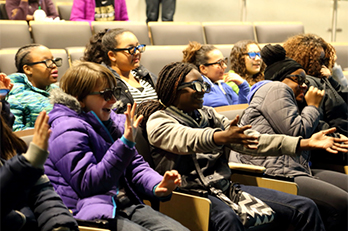
- Girl Scouts of the USA
CIVS-hosted tours and demonstrations of simulation and visualization/virtual reality technologies were among the activities developed for a STEM Night for Girl Scouts at Purdue University Northwest. - Boy Scouts of America
Immersion in VR environments and demonstration/of software tools and environment creation in computer labs. - AIST High School Engineering Seminars
An annual event for around 300 high school students, hosted by the Midwest Chapter of the Association for Iron and Steel Technology at PNW; CIVS provides seminars on virtual iron- and steelmaking processes using simulation and visualization technologies.
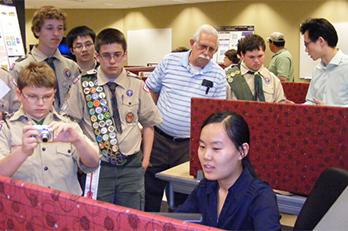
- PNW/Enbridge Engineering Summer Camps
Week-long (or longer) camps for sixth to 12th-grade students with hands-on experiences in mechanical, electrical, computer, and civil engineering topics, held every summer. CIVS provides two-day sessions for students to be engaged in applied simulation and visualization projects. - ASM Student Materials Camp
Semi-annual event hosted by ASM at technical conferences for more than 200 high school students. CIVS develops and provides a 3D video of iron- and steelmaking processes. - Camp Leo
This two-day, PNW-sited camp guides students through applications & admissions processes, financial aid, student support services, and academic expectations (including lecture and lab presentations). CIVS has developed an “Intro to 3D Modeling and Visualization” course for classroom and computer demonstration experience.
By providing a forum for knowledge transfer and professional-development opportunities to collaboration on economic, infrastructure and environmental sustainability, CIVS continues to be an active participant in community initiatives.
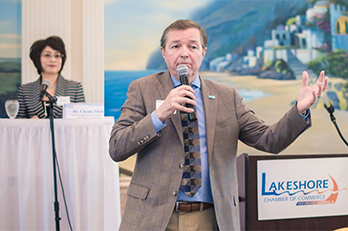
- When the Lake Area United Way, in collaboration with Food Bank of Northwest Indiana and Congressman Pete Visclosky, organized a “Superheroes Against Hunger” Canstruction competition, CIVS researchers developed software to help design and construct the canned-food sculptures and track materials needs and costs.
- CIVS/PNW faculty, staff, and students have also hosted and delivered presentations to regional chambers of commerce, manufacturing summits, Department of Natural Resources boards and leadership and development associations such as Northwest Indiana One Region and the Calumet Area Industrial Commission (CAIC).
- In addition, CIVS faculty and staff are regularcontributors to Purdue Northwest’s Friday University course offerings, whereat adults of any age can find “intellectual enrichment through a variety of interesting discussions in expert-led workshops, without the pressure of pre-requisites or tests.”
Engineering, technology, science, and math teachers joined us for a paid summer research program to stimulate students’ interest in STEM!
The Research Experience for Teachers (RET) program at Purdue University Northwest consists of a six-week summer research program focusing on using simulation and visualization technologies in “smart” manufacturing to increase energy efficiency, optimize production, predict mechanical failures, and improve safety and product quality. The goal is to enhance STEM education and stimulate secondary school and community college students’ STEM interests through partnership with participant teachers, university mentors, and industry engineers using simulation and visualization technologies for innovative industrial solutions and model-based manufacturing.
- Hybrid Learning Experience at Purdue University Northwest (Hammond Campus)
- Participants received a stipend for completing the six-week summer research program.
A Research Experiences for Teachers (RET) Site was established at Purdue University Northwest (PNW)’s Center for Innovation through Visualization and Simulation (CIVS) and Steel Manufacturing Simulation and Visualization Consortium (SMSVC) in 2020. This is the first RET site in Northwest Indiana supported by the National Science Foundation ($592,681 for three years).
The RET site focuses on the Simulation and Visualization Technologies for Innovative Industrial Solutions. It addressed critical issues of workforce development and the skills gap in the industry, which directly impact the nation’s prosperity. The site has provided high school and community college STEM teachers with research experiences and development opportunities to enhance their STEM understanding and teaching effectiveness using virtual learning tools to increase their students’ STEM interests, knowledge, and activities.
Through the research activities, teachers participated in ongoing, modern systems engineering and smart manufacturing research using cutting-edge simulation and visualization technologies in collaboration with CIVS research staff, PNW engineering faculty, and industry collaborators. The research addressed real-world industry issues to increase energy efficiency, optimize production, predict mechanical failures, and improve product quality and safety in industrial workplace settings. Recruitment efforts targeted underrepresented minority school districts, teachers, and historically STEM-underserved populations to bolster growth and diversity in future STEM educational options, career paths, and research infrastructure.
From their exciting research experiences, participants created and implemented virtual learning modules in their classrooms during the academic year. Through these modules, which link the research experiences to STEM education standards and promote investigational and analytical skills, students will be empowered and encouraged to pursue advanced STEM education and career goals. The site also impacted a regional workforce and economy strongly tied to the steel industry.
Program Sessions
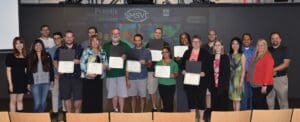
This is the first year of the 3-year NSF RET project. CIVS concluded a 6-week National Science Foundation (NSF) Research Experience for Teachers (RET) summer program with eleven High School and Community College Teachers from Northwest Indiana and Illinois. Specifically, four teachers who developed interactive safety training will develop classroom lessons for Manufacturing, Construction, Welding, Computer Programming, and Quantitative Reasoning; three teachers who finished research for Overhead Crane Stress and Lifespan using FEA will develop lessons for Intro to Engineering and Project Lead The Way (PLTW); another three teachers worked on research with CFD for blast furnace will develop classroom lessons for Chemistry, Environmental Science, and Physics; the other one teacher who researched optimization of reheating furnace plans to develop classroom lessons in statistics for his students.
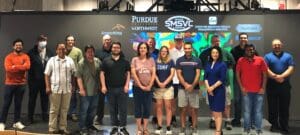
Twelve teachers from local schools, including Munster, Homewood-Flossmoor, Merrillville High School, Whiting High School, Bloom High School, Bishop Noll High School, Portage High School, and Ivy Tech Community College. spent six weeks gaining research experience by using simulation and visualization technologies to solve real-world problems in the areas of blast furnaces, reheating furnaces, cranes, and safety.
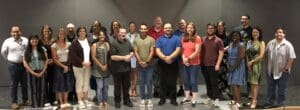
This year’s cohort included 18 teachers who conducted research related to one of the following projects: investigating the impact of using hydrogen instead of natural gas in power plants, decarbonizing flue gas in steel mill reheating furnaces by replacing natural gas with hydrogen, studying the effects of thermal stress in steel products, assessing interactive virtual training software’s use to improve safety and hygiene in the steel industry.
Sponsors
- Purdue University Northwest (PNW)
- School of Engineering at PNW
- PNW Center for Innovation through Visualization and Simulation (CIVS)
- National Science Foundation (NSF)
“We truly appreciate the NSF support and are very excited about this great opportunity to engage both Secondary / Community College Teachers and industries to promote STEM research and education. This also provides excellent opportunities for PNW CIVS and School of Engineering to showcase faculty and students’ real-world research projects, as well as to build a pathway for high school and community college students to pursue engineering degrees at PNW”, said PI: Dr. Chenn Zhou (CIVS & SMSVC Director, ME Professor); CO-PIs: Dr. Chien-Chun Chen (Associate Professor of Civil Engineering), and Dr. Donald Gray (Associate Professor of Electrical Engineering).
PNW’s English Training in Engineering program has maintained long-term cooperation with more than 30 top universities in China and has more than 400 excellent graduates since it was established in 2006. The ETIE program provides students with many unique activities to get to know America, enjoy themselves, and explore more possibilities, including leadership and job opportunities.
It is our honor to be well-recognized by our students, parents, and universities. Our goal will always be to help make young people’s dreams come true!
Translation:
ETIE 项目自2006年建立以来已经有10年历史了。在这10年里一直和国内超过30所顶尖高校保持这友好合作。自始已有超过456名同学成功毕业并且都有了很好的发展。作为这样一个被大家认可的项目我们为我们付出的努力感到骄傲。并且因为能圆大家的梦,我们会持之以恒的努力下去!
Impacts
- About 508 students received ETIE Certificates in AY 2006-2018
- 77% continued at PNW for MSE degrees
- 75% of students worked as RA, TA, or student workers
- 352 students received MSE degree from PNW
- More than 40 students are studying for PhD
- More than 95 students are working in US companies
- More than 215 students are working in China
- Many students attended international conferences, published papers, and received research grants and award